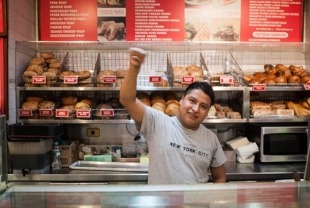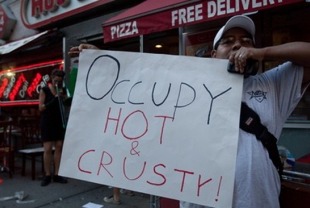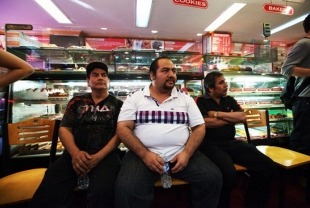Union membership has fallen below 11 percent, the lowest rate since before the New Deal. Well over 90 percent of union contracts have a no strike clause and unions are required by law to enforce it. That is why this enlightening and inspiring documentary gives hope to all of us who believe in fighting for fair wages and improved working conditions. Filmmakers Rachel Lears and Robin Blotnick have created a rousing account of strike that took place in 2012 by the undocumented immigrants working at a Hot & Crusty restaurant and cafe on Second Avenue and 63rd Street in Manhattan.
In the opening scene, we see Mahoma Lopez, an undocumented Mexican immigrant who makes sandwiches, counting out the $290 he's just received for putting in a 60-hour week. That pay averages out to less than $5 an hour. Other workers at the 24-hour deli in the upscale neighborhood are fed up with the way management treats them without respect and with threats that if they do not follow orders, they will be picked up by immigration officials and sent back to where they came from.
Under the guidance of two activists, Mahoma Lopez assumes the mantel of leadership even though he is a man of few words and a little shy. Despite the fears of his Puerto Rican wife who thinks this new role might get him deported to Mexico, Lopez and his co-workers decide to form their own union; the employees fulfill their intention by a vote supervised by the National Labor Relations Board.
The filmmakers do a fine job introducing us to these workers who believe in the justness of their cause. The strike lasts 52 days as they picket outside and inside the chain food restaurant. Many of those in the affluent neighborhood support their cause while others seem to agree with an angry passerby who curses them with "get a job, you commie scum."
This is a timely and important film that compels us to think seriously about the minimum wage; about the continuing inequality between the rich and the poor; about the significant contributions these low-wage service industry workers make to keep the economy humming along; about the need for more civic discussion of the controversial subject of undocumented immigrants; and about the breakthrough these patient and heroic men and women achieve when they secure the contract they want.
When the youthful activists of Occupy Wall Street join forces with these working-class folk, it signals that new alliances and mutual encouragement could signal the real possibility of a new worker's movement.



